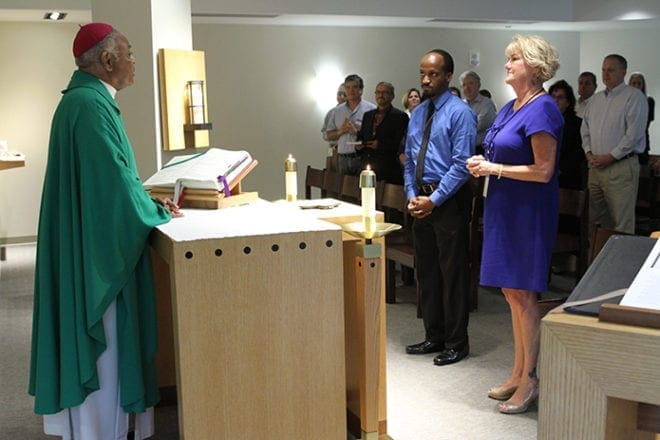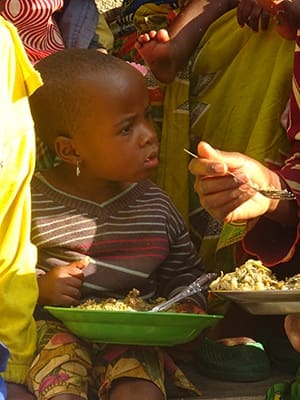One of the first stops for the CRS delegates in Rwanda was the Kigali Genocide Memorial where the remains of more than 250,000 genocide victims are interred. One million people were slaughtered in 100 days in the 1994 genocide of the Tutsi by the Hutus. Rwandans have made great strides toward peace and reconciliation.
Smyrna
Two from Atlanta observe Catholic efforts to help Rwandans
By NICHOLE GOLDEN, Staff Writer | Published December 1, 2016
SMYRNA—Ashley Morris and Kathy Montag, who traveled to Rwanda with Catholic Relief Services as diocesan delegates in September, both hope to return to the African nation.
Morris is associate director of the Office of Intercultural and Ethnic Diversity of the archdiocese. Montag works in CRS Capacity Building and Justice and Peace Ministries of the archdiocesan Office of Life, Dignity and Justice. They joined representatives of other dioceses, including Savannah, for the trip.
Delegates were able to see firsthand how CRS is working through a variety of programs to aid Rwandans in healing from the 1994 genocide of 100 days.
In the more than two decades since then, the people of Rwanda have made great strides toward peace.
Morris said the purpose of the trip was to listen and see.
“It was really to hear their stories,” explained Morris.
Most people know only of Rwanda because of the shocking violence committed during the genocide against the Tutsi.
When Montag and Morris shared their travel plans they experienced similar responses.
“The perception was ‘why are you going to Rwanda?’ The reactions we got were very fearful,” said Montag.

Ashley Morris and Kathy Montag receive a blessing from Archbishop Wilton D. Gregory before they head off for a Sept. 7 Catholic Relief Services delegation visit to Rwanda. Photo By Michael Alexander
Just prior to the immersion trip, delegates participated in training at CRS headquarters in Baltimore, Maryland. Upon returning home delegates look for ways to enhance the work of CRS throughout their respective dioceses.
After arrival in Kigali, the capital of Rwanda, the 10 delegates visited the Kigali Genocide Memorial for a wreath-laying ceremony. The memorial is final resting place for more than 250,000 victims of the genocide against the Tutsi by the Hutu.
“We went right to the memorial,” said Montag. “You learn of the horrific events of just over 100 days. You had Catholics killing Catholics.”
Massive concrete slabs cover the graves.
“And that’s what you could see,” said Morris, alluding to the thousands of unmarked graves around the country.
An estimated 1 million people died in the genocide with neighbors turning against one another.
Work of peace, reconciliation
More than 265,000 Rwandans have benefited from CRS programs in the years since.
In partnership with the Catholic Church and organizations in Rwanda, CRS offers peace-building programs, including COSOPAX, food security programs that show how to grow better crops, and mother and child nutrition programs.
“They have been able to sit down at the table … victim and victimizer,” said Montag about reconciliation programs.
The repair of relationships cannot come from political or government changes, or psychology, she noted.
“It has to come from Christ,” said Montag.
Rwanda is the size of Maryland. With more than 11 million residents, it is the most densely populated country in Africa. More than 80 percent derive income from farming, and 44 percent live below the poverty line.
“Fifty percent are children below the age of 15,” said Morris. “Rwanda is part of the East African Community,” an intergovernmental regional organization of six countries.
It borders Lake Kivu and the Democratic Republic of the Congo, Uganda, Burundi and Tanzania. The borders, as contrasted with other regions of the world, are very open.
“All you need is your ID,” he said.
Because of the open relationships, bordering nations too experienced the traumatic effects of the genocide as some refused refugees.
“It also seeps into the other countries. There’s this mistrust of everybody,” said Morris.
COSOPAX, a French acronym for Women Traders in Solidarity for Peace, is a joint initiative of the Diocese of Cyangugu in Rwanda and dioceses in the nations of Burundi and the Democratic Republic of the Congo. It is funded primarily by CRS.
COSOPAX lays a foundation for peace by bringing women together for social, trade and economic opportunities.
“A huge part of their work is that peace and reconciliation,” said Montag.
Through the formation of autonomous Savings and Internal Lending Communities within the dioceses, and through frequent entrepreneurship training, the COSOPAX women gain skills to improve their businesses and the capacity to fund immediate and future needs.
As important are the friendships the women develop with others, which positively impact their families.
One woman shared testimony that her husband didn’t want her to secure a loan, but later saw the fruits of the loan and her hard work. The younger generations are watching and learning from their mothers, which is key to Rwanda’s future.
Morris noted that Rwandan children have great respect for their mothers.
A woman named Fragile
Montag spent an evening with the COSOPAX women, learning to dance and listening to their stories.
They all have given themselves English nicknames based on a personal quality, she said.
One woman’s story particularly touched Montag.
“This lady introduced herself as Fragile,” she said.
Fragile carried a lot of anger and was working for continued reconciliation with her own family.
“She was successful, but it was very fragile,” said Montag.
When Fragile was telling her story, Montag became emotional.
“We were making eye contact. I was crying,” she said.
Montag arranged with translator Pascasie Musabyemungu of the Diocese of Kigali to talk to Fragile later in the evening.
“I think you should call yourself Courage,” she told the woman.

This Rwandan child, age 5, is the size of an average 2-year-old due to stunting caused by chronic malnutrition. CRS delegates learned about a Crops for Health program in Rwanda that provides food and wellness checks, such as measuring height and weight of participating children.
Montag told her new friend she would pray for her every day, and felt compelled to give her a favorite bracelet. In return, Fragile gave Montag one of her bracelets.
Morris is often asked what the role of the Office of Intercultural and Ethnic Diversity is in Atlanta.
“We help people see God in other cultures,” he told someone recently.
Morris said the office’s mission ties directly into the work of CRS, whether it’s giving a few dollars to the Rice Bowl program, shopping at fair trade sales or supporting Starve Wars.
Supporting CRS and learning more about its work is recognition of God in other communities, and helps others to do God’s work.
He will look for new ways that communities served by the Office of Intercultural and Ethnic Diversity can boost CRS projects in Rwanda.
Priest so thankful for visitors
Morris was moved to see stunting in children, caused by chronic malnutrition. The delegation visited the Hyabihu District where mothers and young children participated in Crops for Health. The program provides meals, and the children are assessed for weight and height. The delegates met a 5-year old who was the size of an average 2-year-old because of lack of proper nutrition.
CRS agricultural programs have helped Rwandans learn to maintain kitchen gardens and to grow foods such as sweet potatoes or cabbage that generate income and better meet nutritional needs.
The Americans attended Mass at the Cathedral of Cyangugu in Rwanda with music provided by the children’s choir. Morris said the liturgies are very joyful. Although the nation is predominantly Catholic, its churches are few and are outnumbered by schools.
Morris said they attended an episcopal conference meeting of Rwandan bishops.
“I assumed the Catholic Church in Rwanda functions the same way as in the U.S.,” said Morris.
He learned, however, that there are not the same financial systems or standards established and CRS is working with the hierarchy to help remedy financial accountability so the church may better serve its people.
“There was a priest. He just continuously thanked us for coming,” said Morris.
The priest, Father Jean, said something Morris cannot forget.
“Us, Rwandans can only dream of going to America. I don’t think America dreams of coming here,” the priest told them.
Montag tried to exchange Rwandan money back into U.S. currency after leaving the country, but it could not be done. At the World Bank in Washington, D.C., they told her, “Nobody visits Rwanda.”
But Morris is hoping to return soon to introduce his wife to the people of Rwanda. A new friend has already offered them a place to stay.
Montag still thinks of Fragile, and wears her bracelet often.
“These are families just like us. We are one human family,” emphasized Montag.
For more information on the work of Catholic Relief Services in Rwanda, go to www.crs.org/our-work-overseas/where-we-work/rwanda.